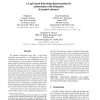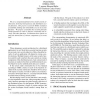103
Voted
CSFW
1999
IEEE
15 years 7 months ago
1999
IEEE
Strand space analysis [13, 12] is a method for stating and proving correctness properties for cryptographic protocols. In this paper we apply the same method to the related proble...
160
Voted
CSFW
1999
IEEE
15 years 7 months ago
1999
IEEE
We propose an efficient automatic checking algorithm, Athena, for analyzing security protocols. Athena incorporates a logic that can express security properties including authenti...
122
Voted
CSFW
1999
IEEE
15 years 7 months ago
1999
IEEE
Software systems are becoming heterogeneous: instead of a small number of large programs from well-established sources, a user's desktop may now consist of many smaller compo...
118
Voted
CSFW
1999
IEEE
15 years 7 months ago
1999
IEEE
The information security community has long debated the exact definition of the term `security'. Even if we focus on the more modest notion of confidentiality the precise def...
113
Voted
CSFW
1999
IEEE
15 years 7 months ago
1999
IEEE
The combination of two security protocols, a simple shared-key communication protocol and the Di e-Hellman key distribution protocol, is modeled formally and proved correct. The m...
111
click to vote
CSFW
1999
IEEE
15 years 7 months ago
1999
IEEE
The term "intransitive noninterference" refers to the information flow properties required of systems like downgraders, in which it may be legitimate for information to ...
135
Voted
CSFW
1999
IEEE
15 years 7 months ago
1999
IEEE
Belief-logic deductions are used in the analysis of cryptographic protocols. We show a new method to decide such logics. In addition to the familiar BAN logic, it is also applicab...
107
Voted
CSFW
1999
IEEE
15 years 7 months ago
1999
IEEE
We use a compositional framework to model security architectures involving heterogeneous and distributed security functions. Our goal is to assist the ITSEC evaluation of suitabil...
140
Voted
CSFW
1999
IEEE
15 years 7 months ago
1999
IEEE
Most formal approaches to security protocol analysis are based on a set of assumptions commonly referred to as the "Dolev-Yao model." In this paper, we use a multiset re...


